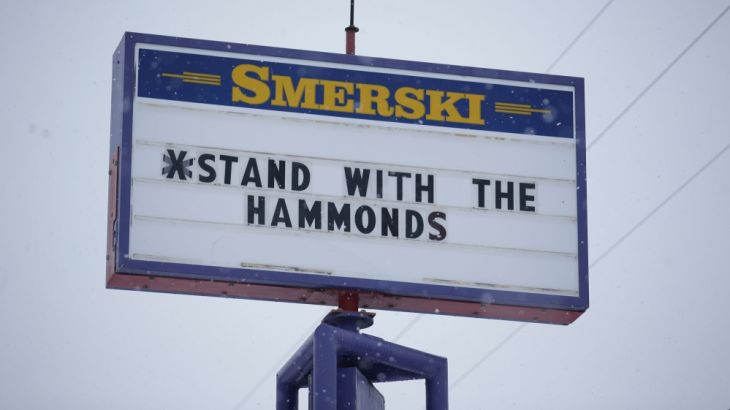Trump pardons ranchers whose case led to 41-day standoff with FBI
Dwight Hammond and his son, Steven, were convicted in 2012 for setting fires that spread to government lands.

US President Donald Trump has pardoned a rancher from Oregon state and his son whose convictions led to a weeks-long armed standoff at a wildlife refuge in 2016.
The two men, Dwight Hammond and his son, Steven, were convicted in 2012 for setting fire to federal lands where they held grazing rights for their cattle.
Keep reading
list of 4 itemsSix takeaways from first day of Trump’s New York hush money criminal trial
Day 1 of Donald Trump’s first criminal trial
What is Donald Trump’s ‘hush money’ trial all about?
“The Hammonds are devoted family men, respected contributors to their local community, and have widespread support from their neighbours, local law enforcement, and farmers and ranchers across the West,” a statement by the White House said.
Their original sentence of three months in prison was turned into five-year terms after an appeal by prosecutors.
The White House statement called the sentencing “unjust”, adding that “the previous administration filed an overzealous appeal that result in the Hammonds being sentenced to five years in prison”.
That sentence led several of their supporters to occupy the Malheur National Wildlife Refuge, which turned into a 41-day standoff with the federal government
The standoff in support of the Hammonds was led by Ammon Bundy, the son of Nevada rancher Cliven Bundy, who was involved in a high-profile 2014 standoff with the government over grazing rights.
Bundy’s militia, which included people from as far away as Arizona and Michigan, seized the headquarters of refuge as part of a long-running dispute over federal control of public lands in western US.
Bundy and his supporters were eventually arrested, most of them during a confrontation with the FBI and state police on a snow-covered roadside where a spokesman for the group, Robert “LaVoy” Finicum, was shot dead.
For decades, land rights has been a thorny issue in western US states, where the federal government owns most of the land.
Many conservative politicians and ranchers argue that the land has been mismanaged and should be handed over to states or turned into private property.
Trump’s pardons
In total, Trump has pardoned nine people since taking office in January 2017.
Some of his pardons, including Tuesday’s, have been considered controversial by people critical of his policies.
Others granted clemency include Arizona ex-Sheriff Joe Arpaio, who was convicted of contempt of court after he did not comply with a court order to stop racial-profiling practices in his county, and Dinesh D’Souza, who was convicted of campaign finances fraud.
Until Tuesday, his most recent pardon was that of Alice Marie Johnson, a first-time drug offender who had been convicted to life in prison.
Trump has also said on Twitter he could pardon himself in case he would be convicted as a result of Special Counsel Robert Mueller’s investigation into alleged Russian meddling in the 2016 US presidential elections.